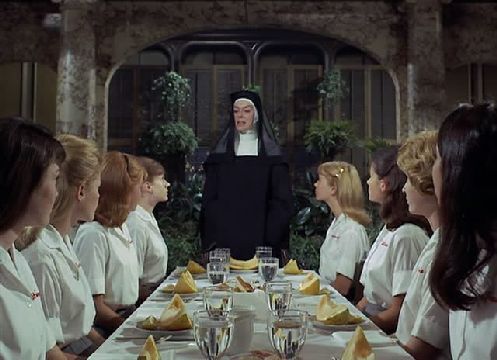The Trouble With Angels (1966) 
“It’s the habit forming comedy the whole family can enjoy!”

The Trouble with Angels (1966)
Director: Ida Lupino
Cast: Rosalind Russell, Hayley Mills, Binnie Barnes
Synopsis: Two high-spirited young students at St. Francis Academy For Girls keep things hopping for the challenged Mother Superior and her staff of bewildered Sisters.
The Trouble with Angels is the kind of film that doesn’t age well, and which would perhaps have even been a touch outdated when it was released had it not combined its dull grey convent school milieu with the mischievous youthful exuberance of young Hayley Mills (Twisted Nerve), who, fresh out of a contract with Disney, was at the height of her popularity when this was made. Ironically, The Trouble with Angel’s is exactly the kind of inoffensive, family-orientated fluff that Disney might have produced.
Mills plays Mary Clancy, reluctant boarder at a Catholic convent school run by Rosalind Russell’s Mother Superior. Russell (His Girl Friday) is driven to distraction by the mischievous antics of Mary and her partner-in-crime Rachel (June Harding), but as time goes on, Mary begins to develop an understanding and respect of both the Mother Superior and the Catholic Church.
Even though it’s based on a novel, The Trouble with Angels is very episodic in structure, with many of the episodes seeming to serve no useful purpose in terms of character development other than to show us what a pair of mischievous tykes Mary and Rachel are. The antics they get up to are pretty tame: smoking in the toilets, guided tours of the nun’s living quarters, soap powder in the sugar bowls, that kind of thing, and the two girls pay the price for committing each and every one of them. Russell pretty much makes the film as an outwardly stern, but fair and loving matriarch whose patience eventually outlasts Mary’s propensity for mischief.
The Trouble with Angels provides undemanding old-fashioned family entertainment, and there’s nothing wrong with that. But that episodic structure means its’ nearly two hour running time is too long, and not enough of what has taken place before prepares us for – or makes believable – young Mary’s abrupt change of outlook in the final reel.
(Reviewed 22nd March 2012
httpv://www.youtube.com/watch?v=zqo_4muoBhM

